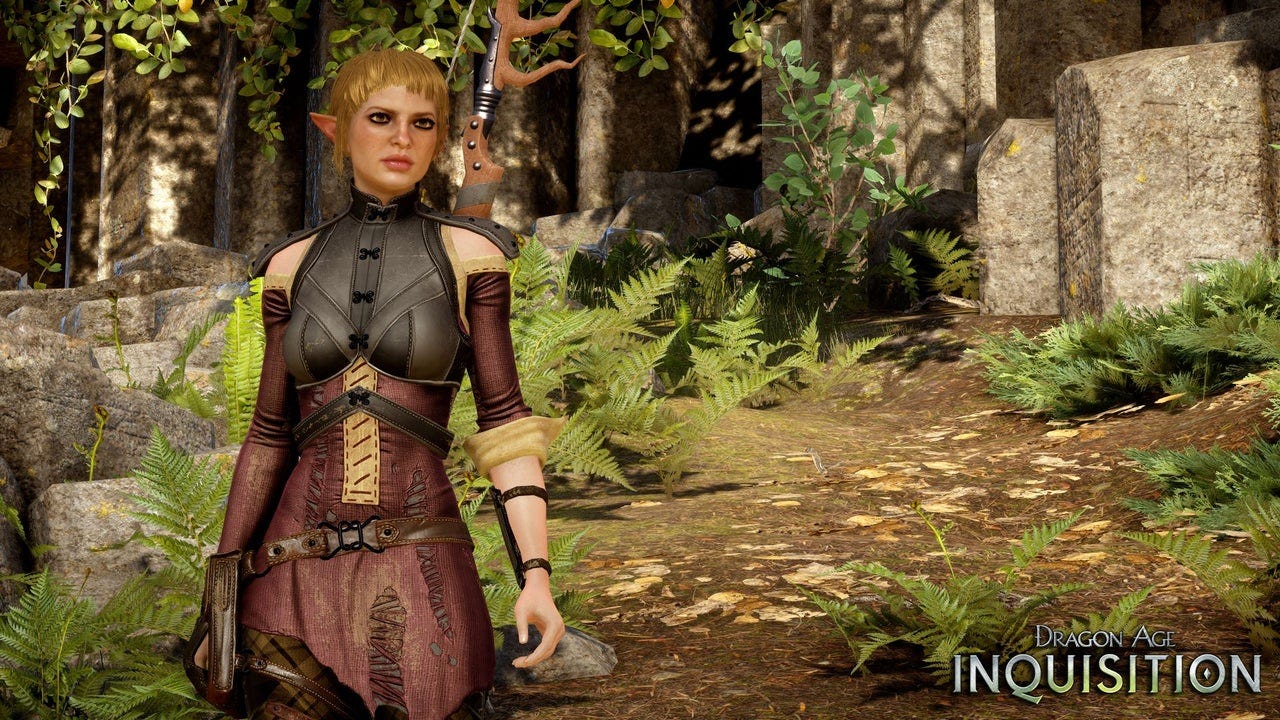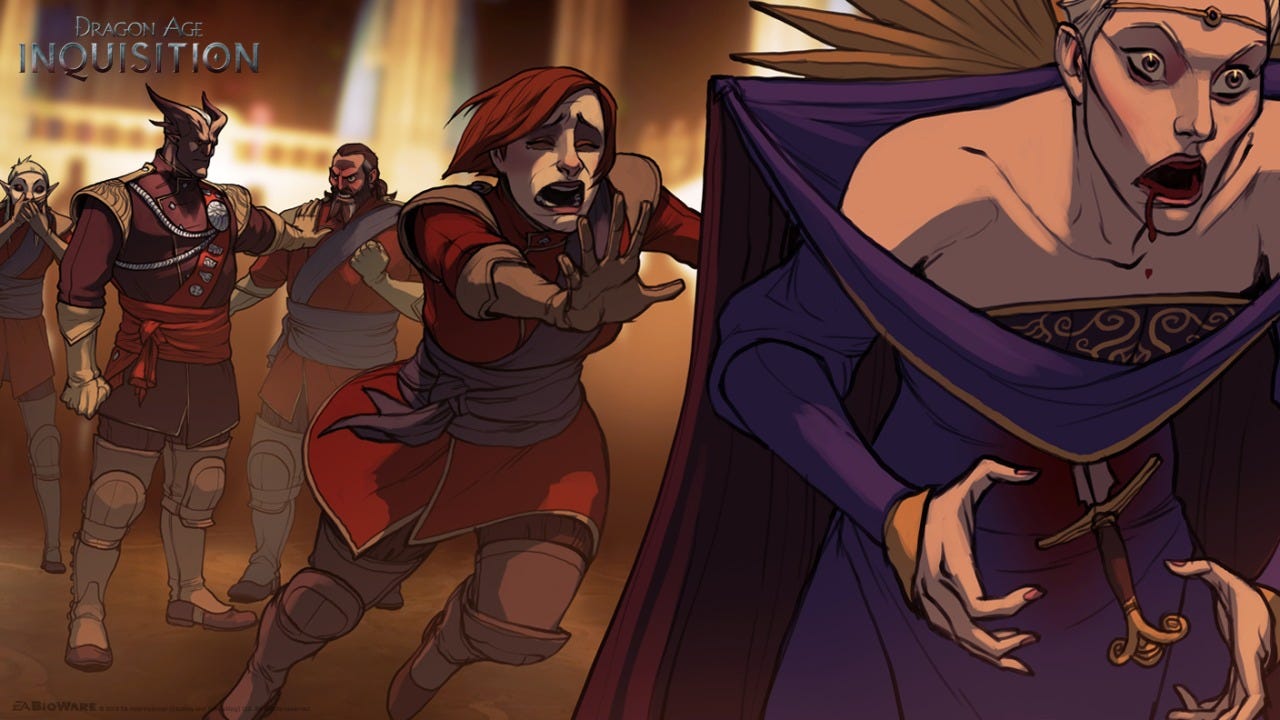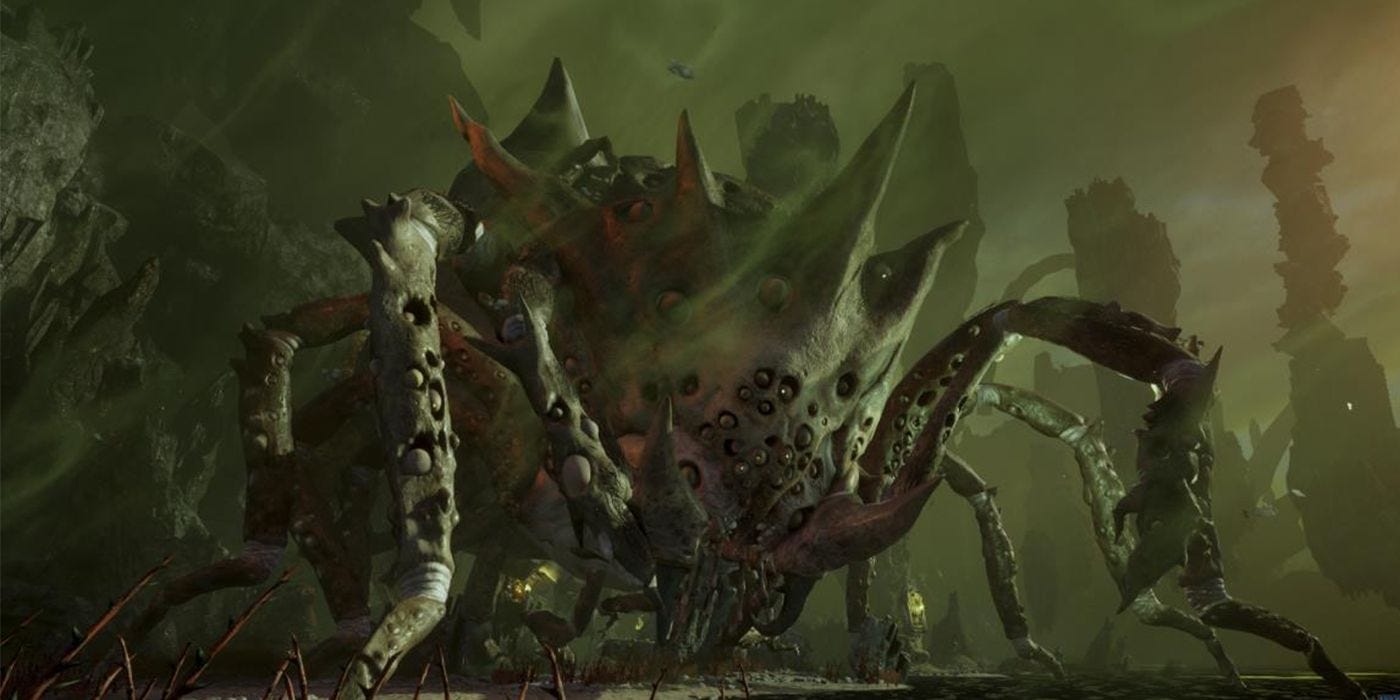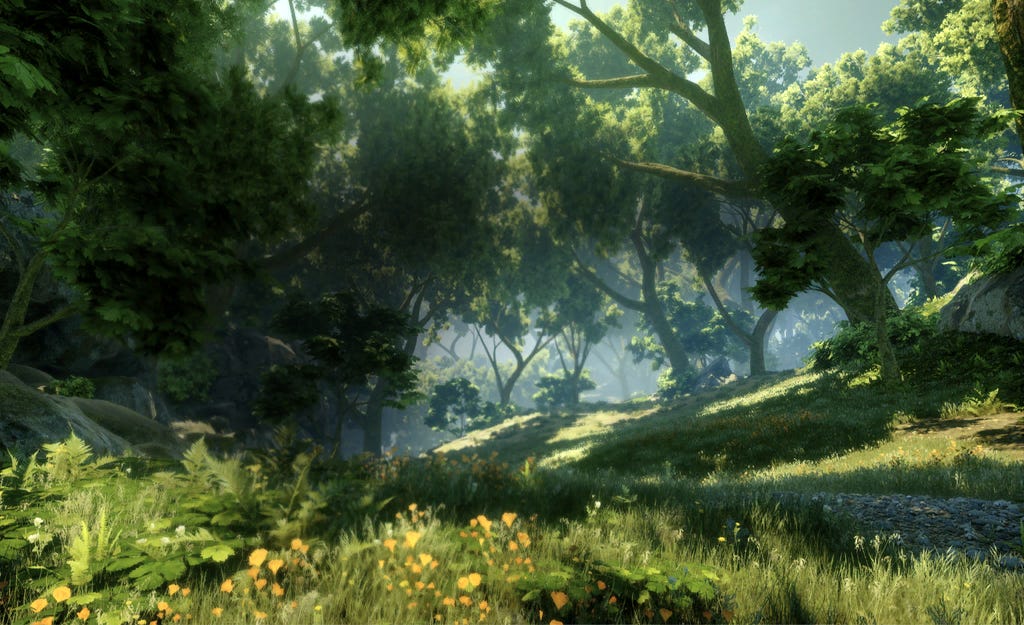My Dragon Age: Veilguard Review - 6/10
Dragon Age: Inquisition was a tough act to follow. Veilguard... did not deliver. It has fallen down the "content, not art" commercial paradigm that Disney and Netflix have fallen for.
Before I dive in I will say that Dragon Age: Veilguard was a good game. Highly playable, no bugs on launch, follows in the spirit of Dragon Age. The combat was excellent, by far the most fun of any Dragon Age game so far. It reminded me of the fast-paced combo-chaining of Mass Effect: Andromeda (which I also loved). The worst part, by far, was the music (or lack thereof). There was hardly any score whatsoever, and there was an absolute absence of any epic motif.
But Veilguard had one fatal flaw: it didn’t really make me feel anything.
My wife and I were talking as I was finishing up the final “suicide mission” in Veilguard. She said it best:
There’s no “Dawn Shall Come” moment in Veilguard.
I remember playing through Inquisition and I was like “okay, yeah, I get it, this is a good game” (I picked it up several years after it had come out) but I wasn’t fully bought in until Corypheus says the iconic line “I have seen the throne of gods, and it is empty!”
It takes some literary chutzpah to deliver that line at the end of the first act of a game. What follows is Haven gets destroyed, your Inquisitor nearly freezes to death, and then you get the song.
Now, a single song does not make a game. But it was this attention to detail, and the recognition of an entire dimension of gameplay that really set Inquisition apart. After this scene, I was hooked. I was fully bought in.
But it goes beyond one theme song, which plays over and over again throughout the story. It also includes the clarion melancholy of the soundtrack of the Hinterlands and the fully immersive experience at the Winter Palace. All of these are missing from Veilguard. There are no analogs in the latest game.
From a writing perspective, those scenes are called setpiece moments, centerpieces of a story that serve as focal points, narrative fulcrums around which the rest of the story bends.
Characters
The characters in Veilguard are simple and relatively uncomplicated. WYSIWYG. What you see is what you get. Bellara is an insecure manic pixie dream girl, sure to be popular with young boys. She’s unintimidating, enthusiastic, earnest, and caring. But not exactly hero material. Not like Leliana or Sera. But I recognize I’m picking on the weakest character in Veilguard.

Lucanis, which my wife dubbed “Anders 2.0”, is one of my favorite characters because he’s complex, has a backstory, and literally struggles with demons. He comes the closest to actually causing problems for the team. But otherwise, they were just sort of… simple. Very unidirectional. You don’t have to fight to keep the team together, no one is butting heads. They are all inexplicably bought into the Veilguard. Your initial team, Harding and Neve, sort of make sense. They are the founding team other than Varric and Rook, so they get a free pass. But everyone else just sort of… shows up and has seemingly no stakes to stay involved. Ostensibly, Bellara joins because you’re helping the Veil Jumpers and protect Arlathan, okay fine. Lucanis has the most direct debt to Rook, so it makes sense that he’d stick around for a bit. But the rest just sort of seem to show up, move into the Lighthouse, and shrug.

Compare this to say, Sera. For her, it was personal. Joining the Inquisition was because she was a Red Jenny and she saw that all the “little people” were about to get crushed, and if she can shoot a few arrows at the “big people” and get things back to normal, great. Blackwall, likewise, was complicated. And you even have to decide whether you’re going to save him from prison. Cole was one of the most fascinating characters, the enigmatic spirit who collected flies and helped wounded soldiers die with ease. Even Vivienne, who I could not freaking stand, was a phenomenal character because she made me feel something.
In short, the characters in Veilguard are bland. They are cute, have some motivations. But they are uncomplicated, inoffensive, and even though their stories are far more involved than Inquisition (you really have to work to get their loyalty or romance) they had almost no personality.
Wicked Eyes, The Veil
A lot of people hated missions like the Orlesian palace and the Veil missions in previous games, but those were the kinds of missions that set these games apart. Without that narrative depth, they become more like generic hack-n-slash games.
For one mission in Inquisition you set down your sword or staff and instead have to play the Grand Game in the Orlesian court. That is so freaking cool. You’re there to investigate murders, assassinations, and sneak around. You even get to dance with the empress if you want. In Veilguard, you have a unidirectional experience. It’s all just hack-n-slash the whole way through. No need to use wit, keep track of characters, or make empire-changing decisions.
As an aside, the more I write about the differences between Veilguard and Inquisition, the more I realize that the narrative decisions made in Veilguard are bewildering and inexcusable. They clearly had the budget and the time to write a great game. Veilguard clearly had the production value.
Instead, Veilguard became extremely repetitive. “Oh great, another conversation at the Cobbled Swan.” Really? When you can make literally anything you choose to have a solid half of the later plot-driving conversations at a freaking tavern? A tavern, by the way, which is less realized than the castle bar in Skyhold!
The World Feels Overwhelming
Inquisition is chocked full of setpiece moments, iconic soundscapes, and complex characters (some of whom don’t get along!) Plus the business of being Inquisitor, managing relationships, and exploring the world… none of that really happens in Veilguard. You just sort of are handed a stronghold by Solas. It’s not earned.
Oh, and I haven’t even talked about my favorite character from Inquisition: Cassandra. Cassie. Complicated, having a crisis of faith, put in impossible situations, and has an embarrassing love of smut writing. One single character in Inquisition has more depth and complexity than half the cast of Veilguard.
Now, I know that Inquisition has the benefit of several expansions, namely Descent and Trespasser, but everything I’ve mentioned so far is in the base game.
Even though Inquisition was the third game in the series, the world of Thedas still felt overwhelming, strange, and mysterious. In a word: untamed. But Veilguard walks you through highly tamed cities, and the two “natural” environments (Arlathan and Hossberg) feel… almost suburban by comparison.
When you show up to a region in Inquisition, it’s very clear that each area has its own stories and problems. Very often, you show up in the middle of a civil war, a rebel uprising, or an outbreak of dragons, much of it has absolutely nothing to do with the Blight or inquisition itself. This makes the world in Inquisition feel very much alive and lived-in.
I could keep going but I think you get the idea. In summary, my biggest complains are:
Veilguard didn’t make me feel much, not until the very end (spoilers incoming)
The characters in Veilguard were simple, uncomplicated, flat, and someone unidirectional.
The settings in Veilguard were pretty, but tamed and generic.
There was a lack of iconic images, moments, and music.
It became extremely repetitive, often going to special locations just to have the same conversations over, and over, and over again.
Okay, so what was good?
I gave it a 6 out of 10.
The combat was genuinely fun. It was less old-school RPG and more action/adventure, which was nice. The production value was also top notch. There were no bugs (what a low bar, huh?) and it was clear the game had been play-tested.
Spoilers incoming.
I didn’t really feel anything until the end. Realizing that Varric had died in the opening scene was a gut punch. That was one of the few highly earned emotional moments in the whole game. That, following Davrin and Assan falling into the Blight was also incredible. The way they were able to show the anguish in Assan, diving after Davrin was remarkable. But… that was just one setpiece moment.
The lore was also good and consistent. We got a lot of answers from the previous games. But… it sort of felt unearned. In Inquisition, part of the thrill of replays was making different choices and getting some very different experiences. Characters notice different things, and you really have to look for everything. That novelty made it highly replayable (I’ve played Inquisition all the way through at least five or six times, plus a dozen or more partial playthroughs). It feels like the difference between earlier Star Trek and more recent Trek when the galaxy feels smaller, with fewer unknowns, and much less mystery. To be fair, Dune Part 2 had the same problem. In Part 1, we were learning this new world and getting the lay of the land. Sorry, I’m falling back into criticism.
I did like the lore and continuity, though. I just didn’t like being spoonfed all the lore. That level of opacity in the previous games was actually a feature, not a bug. Sort of like when in the Star Wars prequels, they just explain that midichlorians are… Force-sensitive mitochondria. Who cares?
Final Thoughts
I’m not sad I bought this game. I did, however, get so bored halfway through that I almost stopped playing it. I realized that I was avoiding the game because the dialog was boring, repetitive, and childish. This game is clearly made for a younger audience who needs things spelled out for them… multiple times. So I made a deal with myself; just skip all the dialog. So for the second half of the game, I’ve done just that. I only slow down to listen to the really important bits, which are few and far between.
It is somewhat incomprehensible to me that they had a full ten years to do better with the writing, so to me, this seems like a choice. They chose to make a simpler game with simpler characters. But some fun combat alone does not make a great game. It’s a huge letdown from Inquisition, and certainly not worth waiting a decade for. I remember hearing the news trickle out of Bioware, that legendary long-haulers like David Gaider and Casey Hudson were leaving or getting fired.
And it really shows.
My wife and I are movie snobs and we can tell when TV shows and movies are written by guild writers versus actual talent, and Veilguard falls into this category. It lacked the courage to say or do anything new or meaningful, and really banked on the intellectual and creative inheritance of greater minds and more talented artists who came before.
My recommendation for Dragon Age fans: give it a pass until they release a bunch of DLC and expansions, leave it in your wishlist until it goes on sale.







For me the game was just an empty shell of a franchise that used to be great but these days what game isn’t ?